Google Pixel 8 Pro: release date, specs, camera and more
The Pixel 8 Pro is smarter, slicker and faster
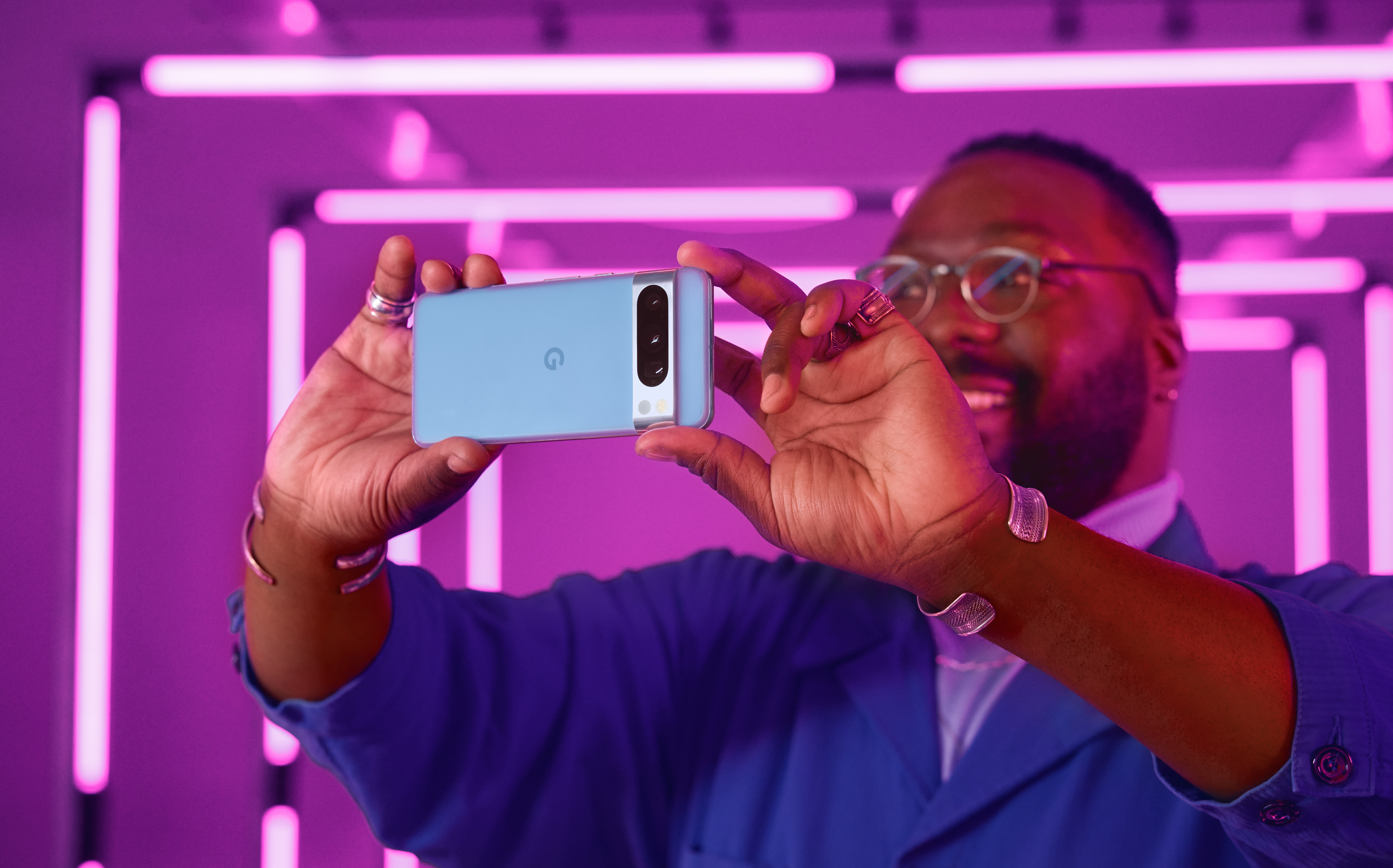
Sign up for breaking news, reviews, opinion, top tech deals, and more.
You are now subscribed
Your newsletter sign-up was successful
Google's new Pixel 8 Pro marks an evolution of the Pixel formula established with the Pixel 6 Pro, leaning hard into AI processing and smart features to create a smartphone that's designed to be one the best Android phones you can buy.
Focused on evolution rather than revolution, the Pixel 8 Pro has a suite of refinements over its predecessors, and gains a new AI-centric chip to power a host of intelligent tools, from smart photo editing to the ability to summarize web pages.
We have now fully reviewed the Pixel 8 Pro and have been rather impressed with the phone's capabilities and smart upgrades. So for a detailed look at how we put this flagship Android phone through its paces, check out our Google Pixel 8 Pro review . And if you want to see how its smaller and cheaper sibling fared in our testing, do read our Google Pixel 8 review.
Google Pixel 8 Pro: release date and price
Google fully revealed the Pixel 8 Pro on October 4, 2023 at a Google Pixel 8 launch event.
Pre-orders for the phone are now live, with the Pixel 8 Pro going on sale on October 12. Prices start at $999 / £999 / AU$1,699, which is a notable jump in price over the Pixel 7 Pro which started at $899 / £849 / AU$1,299.
| Storage | US price | UK price | AU price |
| 128GB | $999 | £999 | AU$1,699 |
| 256GB | $1,059 | £1,059 | AU$1,799 |
| 512GB | $1,179 | £1,179 (only available in Obsidian) | AU$1,999 |
| 1TB (US only) | $1,399 (only available in Obsidian) | N/A | N/A |
Note that a new 1TB storage option is a US exclusive at launch, while the top storage configurations available in the US and UK are only available in Obsidian, while lower storage tiers can be had in any available colorway.
Google also announced a nice new wearable for those interested in buying a Pixel 8 or 8 Pro, and we have all you need to know on the Pixel Watch 2 too, if you're interested.
Sign up for breaking news, reviews, opinion, top tech deals, and more.
Google Pixel 8 Pro: design and display
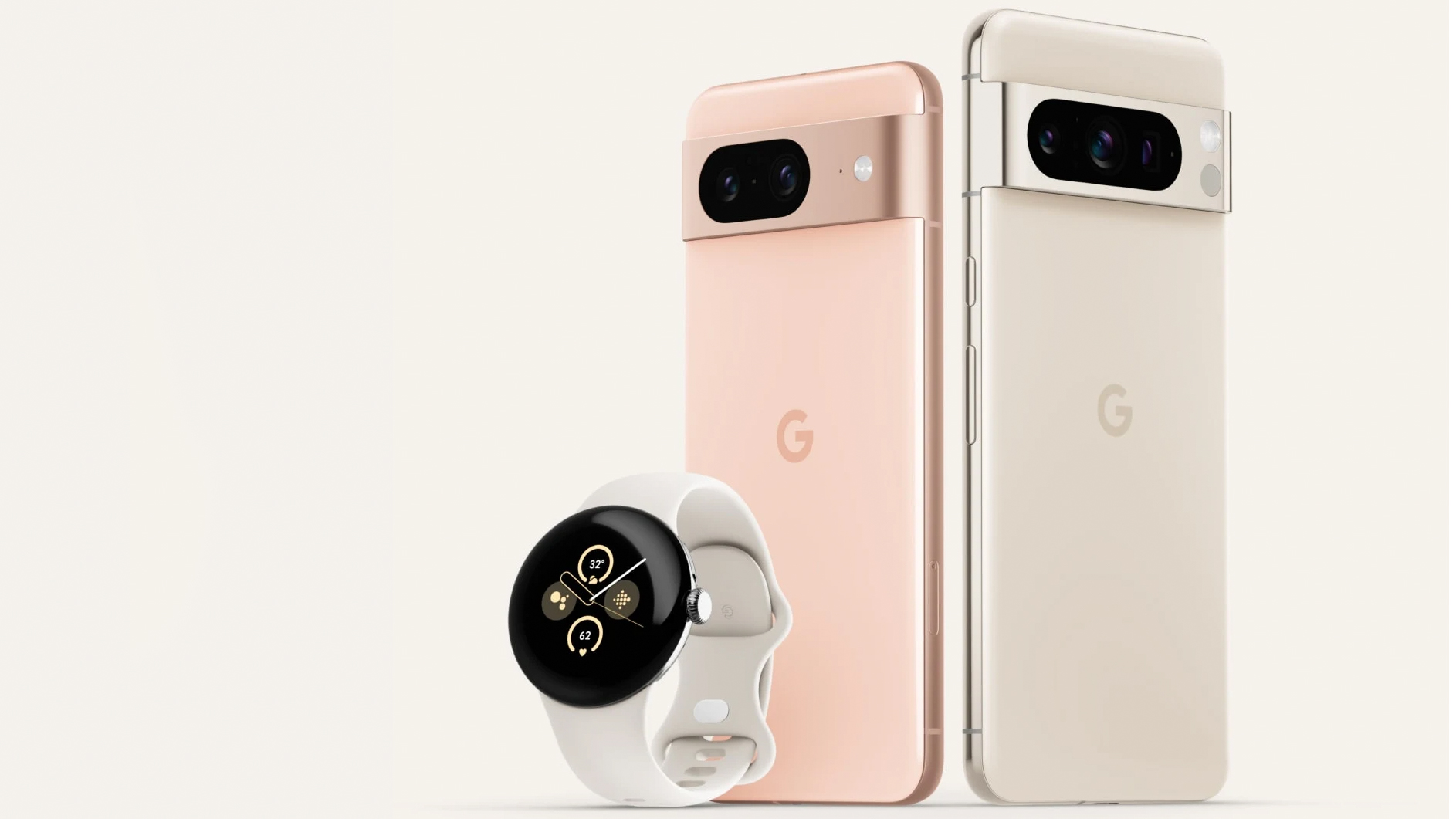
At a quick glance, you'd likely struggle to spot the Pixel 8 Pro from its predecessor, as Google hasn't mixed up the design a lot. But on closer inspection, you'll notice a series of small but district changes.
Most obviously is the rear camera bar now has a single pill-shaped cutout for all three of the Pixel 8 Pro's cameras, rather than a pair of cutouts. And alongside the flash is a new temperature sensor; more on that later.
The second change is smoother rounded edges that better blend in with the screen. Sporting a "Super Actua" display, the screen is now flat rather than curved at the edges like those of the Pixel 7 Pro.
It's also using an LTPO panel that can now go from 120Hz to a mere 1Hz, whereas the 7 Pro's screen could only go down to 10Hz. This new display is also 42% brighter than before, topping out at 2,000 nits of peak brightness. One thing that hasn't changed is the smaller cutout for the selfie camera and the under-display fingerprint scanner that sit in the same spots as those on the Pixel 7 Pro.
In terms of specific measurements, the Pixel 8 Pro is 162.6 x 76.5 x 8.8mm and weighs 213 grams. Colors come in Obsidian (black), Porcelain (white) and Bay (light blue).
Google Pixel 8 Pro cameras
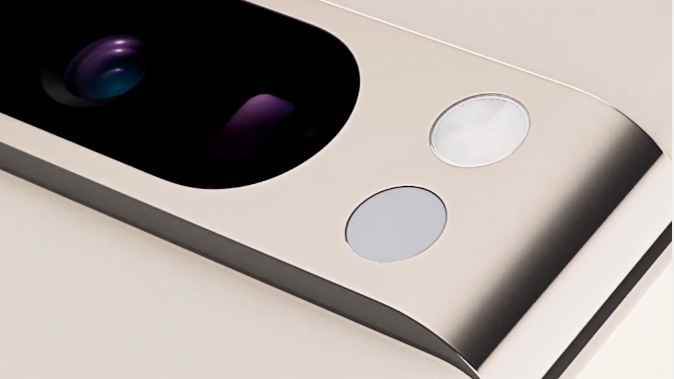
All three of the Pixel 8 Pro's rear cameras have been upgraded. While the 50MP main camera still has the same resolution as before, it has a new sensor that has 21% better light sensitivity. So we can expect improved low-light photos and detail in shots with challenging lighting.
The ultra-wide camera now comes in a 48MP and has an improved Macro Focus mode that lets users get closer than before to a subject, hopefully impressing us more than the macro mode on the Pixel 7 Pro.
The telephoto camera comes in at 48MP once again, but comes with an f/2.8 aperture and a wider field of view at 21.8 degrees.
Flip the Pixel 8 Pro around and the 10.5MP camera has been given a 95-degree field of view and autofocus for improved selfies.
However, it's on the software side that Google has brought in some big changes. A redesigned camera app yields new AI-powered features such as the Magic Editor, which lets you move objects around in a photo with the software smartly filling in any gaps. Best Take smartly stitches together various photos, to give you the option of selecting the best rendition of, say, a person in a group shot to make sure they have a smile on their face.
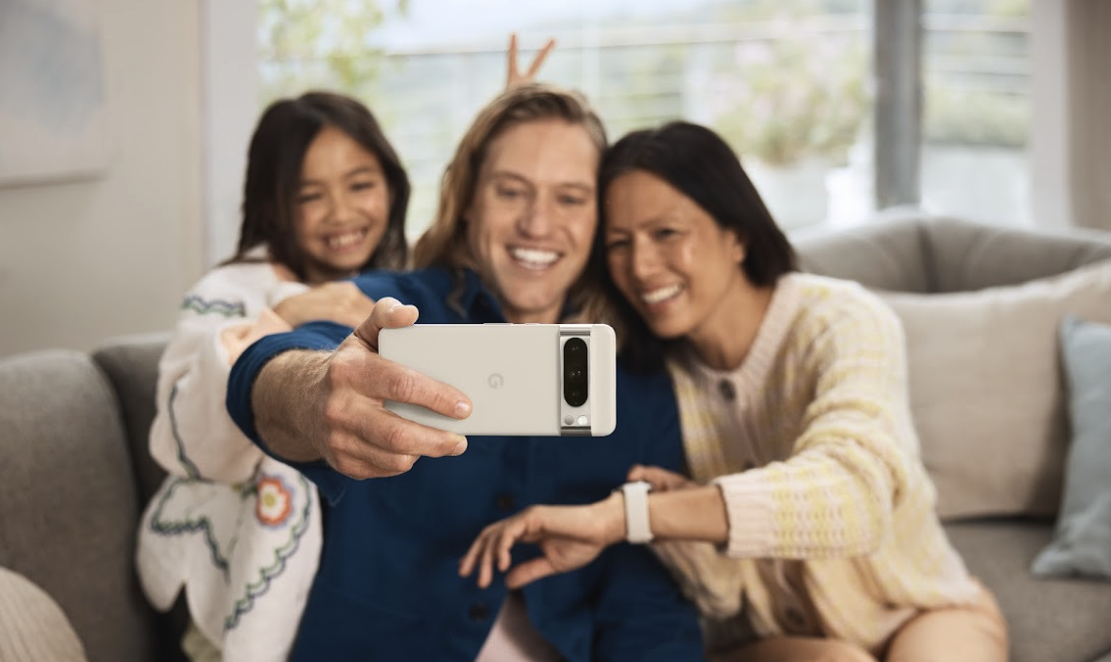
Real Tone, which attempts to more accurately capture skin tones, now works on videos, as does Night Sight, and there's a new Video Boost feature exclusive for the Pixel 8 Pro that brings computational photography processing to video recording. Plus there's the new Audio Magic Eraser, which can cut out distracting and unwanted noises from video recordings.
One unusual feature on the rear camera array is a temperature sensor. Simply point it at an object and it will read the temperature of it. What might seem like a gimmick, Google touted as a way to track skin temperature and thus wellness, though how useful that proves to be we'll have to wait and see.
Google Pixel 8 Pro specs and battery
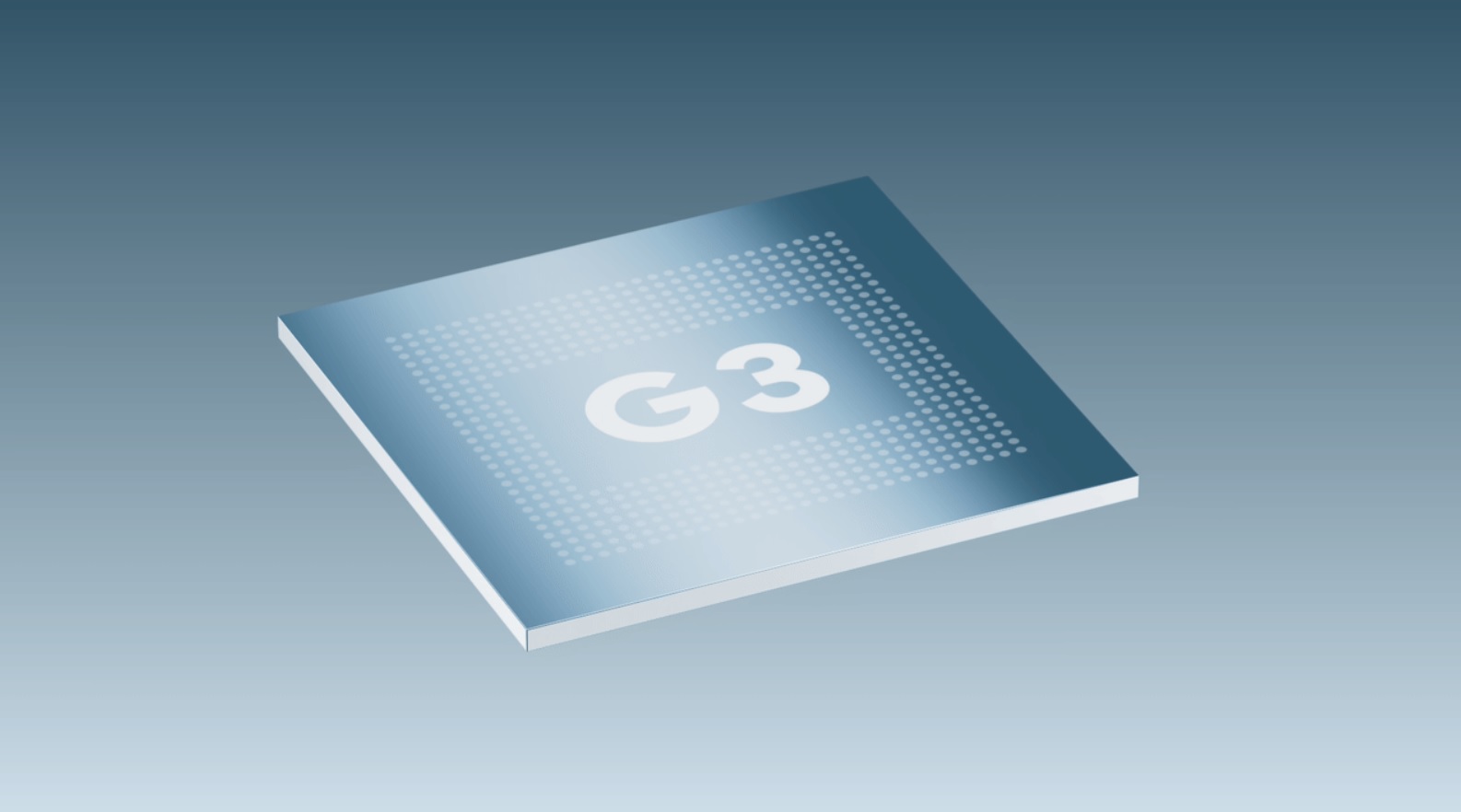
The star of the Pixel 8 Pro's specs sheet is the new Tensor G3 chip. First revealed at Google I/O 2023, the chipset has a new ARM-based CPU and GPU, promising improved performance over its predecessor and enough virtual horsepower to handle most smartphone tasks with ease.
However, the AI-centric Tensor Processing Units (TPUs) and the ability to tap into cloud-based TPUs, give the Pixel 8 Pro its true smarts. This means it can provide smarter call screening with a virtual response that uses natural language to sound more real. And those smart capabilities extend to other features, such as being able to read out a variety of text sources or convert web pages to another language on the fly.
| Row 0 - Cell 1 | |
| Dimensions: | 162.6 x 76.5 x 8.8mm |
| Weight: | 213g |
| Display: | 6.7-inch 1344 x 2992 adaptive 1Hz to 120Hz 'Super Actua' LTPO OLED |
| Chipset: | Google Tensor G3 |
| RAM: | 12GB (LPDDR5X) |
| Storage: | 128GB, 256GB, 512GB, 1TB (UFS 3.1) |
| OS (at launch): | Android 14 |
| Primary camera: | 'New' 50MP, f/1.68, 82° FoV w/ OIS |
| Ultra-wide camera: | 48MP, f/1.95, 125.5º FoV |
| Telephoto camera: | 48MP, f/2.8, 21.8º FoV w/ 5x optical zoom |
| Front Camera: | 10.5MP, f/2.2, 95º FoV |
| Battery: | 5,050mAh |
| Charging: | 30W wired, 23W wireless (2nd-gen Pixel Stand), 12W wireless (Qi) |
| Colors: | Obsidian, Porcelain, Bay |
Other specs include the Titan M2 security coprocessor – which means Face Unlock on the Pixel 8 Pro is at the highest Android security level – 12GB of LPDDR5X RAM and storage options of 128GB, 256GB and 512GB.
A 5,050mAh battery promises "beyond 24-hour battery life" and wired charging has been boosted to 30 watts, up from the 27W wired charging of the Pixel 7 Pro. Wireless charging remains at 23 watts using the Pixel Stand and at 12 watts using Qi-certified chargers.
Google Pixel 8 Pro software
The Google Pixel 8 Pro will come running Android 14 out of the box, bringing with it updates such as enhanced lock screen customization and improved Find My functionality and support for emergency satellite communication at times when the phone has no signal.
Arguably the biggest software change is the seven years of operating system and security updates Google will offer for the Pixel 8 range and future Pixel phones. This should greatly extend the feature set and functionality of the Pixel 8 Pro even as it ages.
Google Pixel 8 Pro outlook
While the Google Pixel 8 Pro may seem like an iterative upgrade over the Pixel 7 Pro, once you dig a bit deeper there's a mix of tweaks that add up to a more significant overall upgrade.
Not only has the Pixel 8 Pro had a nip and a tuck, but it's also faster, smarter and more capable than ever before. We'll need to fully review the Pixel 8 Pro before we cast our final judgment, but so far it looks to be a contender for a spot on our best phones list.
Roland Moore-Colyer is Managing Editor at TechRadar with a focus on phones and tablets, but a general interest in all things tech, especially those with a good story behind them. He can also be found writing about games, computers, and cars when the occasion arrives, and supports with the day-to-day running of TechRadar. When not at his desk Roland can be found wandering around London, often with a look of curiosity on his face and a nose for food markets.